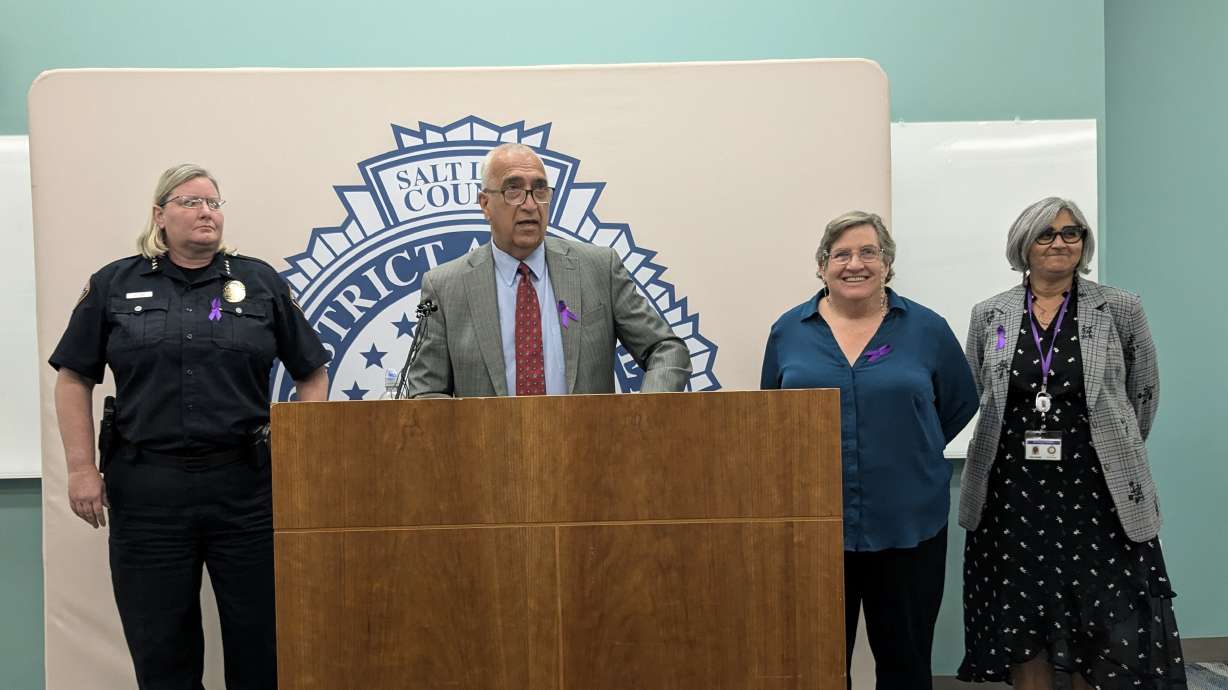Estimated read time: 4-5 minutes
This archived news story is available only for your personal, non-commercial use. Information in the story may be outdated or superseded by additional information. Reading or replaying the story in its archived form does not constitute a republication of the story.
- Utah officials emphasize the need for societal change to support survivors of domestic violence, highlighting that over a third of the women in the state are likely to experience such violence.
- Salt Lake County DA Sim Gill noted that only half of these cases are reported.
- During Domestic Violence Awareness Month, efforts are being made to ensure victims feel safe seeking assistance.
SALT LAKE CITY — Of the 1.6 million women living in Utah, it's estimated more than 550,000 of them will experience some form of domestic violence in their lifetimes.
That's according to the latest collection of data, from 2021. Only half of these cases will be reported, according to Salt Lake District Attorney Sim Gill, unless changes are created now to make it more accessible for victims to come forward and trust that the law is on their side.
"We ought to be asking ourselves why half of the victims of domestic violence still feel unsafe and unwilling to come forward. ... That is on us, as a community and a society, to make sure that happens," Gill said at a press conference on Thursday. "Echo loudly and amplify to victim-survivors that it is not their fault ... and if you take one step toward us, we promise and commit to take three, four steps in your direction to meet you where you are. ... No shame, no judgment."
October has been designated nationally as Domestic Violence Awareness Month, a time for communities to highlight the programs and projects created to decrease the prevalence of intimate partner violence. Salt Lake City and others across the state have used the month to bring attention to the issue and ask community members to assist their neighbors when they ask for it.
This year, however, the Salt Lake County District Attorney's Office is joining forces with West Valley City police and the Utah Coalition Against Sexual Assault to present a message to the community and to victims: We must first ensure victims of domestic violence that they will be safe when seeking assistance from law enforcement and change the paradigm so victims know they will not be blamed for staying with their abuser.
Strangling, a common act in domestic violence cases, puts the victim at a higher risk for homicide and, as such, Gill informed reporters that his office adds it as a separate charge when they discover its use. It happens often that Utah sexual assault nurse examiners — who have put an emphasis on understanding the use of strangulation in their own work — are called to assist in cases with evidence of strangulation.
Gill also noted that in the last three years, his office has prosecuted close to 10,000 domestic and dating violence cases. He also acknowledged that for more women to come forward, community advocates and partnerships are essential to creating trust between a victim and law enforcement.
Salt Lake County now has a Family Justice Center in conjunction with YWCA Utah, where safety assessments and planning, support groups, protective order assistance and more can take place. Utah County also has a Family Justice Center.
"We will work with you to identify what are the next steps in the journey that you need to take," said Asha Parekh, director of the Survivor and Victim Services Division within the Salt Lake County District Attorney's Office. "We are here to help you. ... We are your support. Don't be afraid."
A paradigm shift was also promoted during the press conference, calling for an understanding of domestic violence among community residents. Residents must also think about why someone opts to abuse their partner. Gill called on the general society to look at themselves to discuss what behaviors are followed, how partners are treated in relationships, and how we discuss domestic violence with each other, if at all.
There also is a need for an understanding that prosecuting these cases is not as cut and dry as other criminal cases. On several occasions, a domestic violence victim will decide to drop charges or refuse to tell a judge what happened. Due to being a recipient of a Department of Justice grant for $500,000, local law enforcement will be trained over the next three years about the best practices when assisting a victim of domestic violence.
Realizing that many victims change their minds due to trauma — including the fear that they will be killed for seeking help or prosecution — is vital for domestic violence survivors to trust they will be treated fairly and respectfully.
"Domestic violence, sexual assault ... they happen everywhere, all across the state, in every community," said Susan Chasson, program manager for the Utah Coalition Against Sexual Assault. "This is a problem that impacts everyone. We all know survivors of this type of trauma."
Domestic violence resources
Help for people in abusive relationships can be found by contacting:
- Utah Domestic Violence Coalition: Utah's confidential statewide, 24-hour domestic violence hotline at 1-800-897-LINK (5465)
- YWCA Women in Jeopardy program: 801-537-8600
- Utah's statewide child abuse and neglect hotline: 1-855-323-DCFS (3237)
- National Domestic Violence Hotline: 1-800-799-SAFE (7233)








